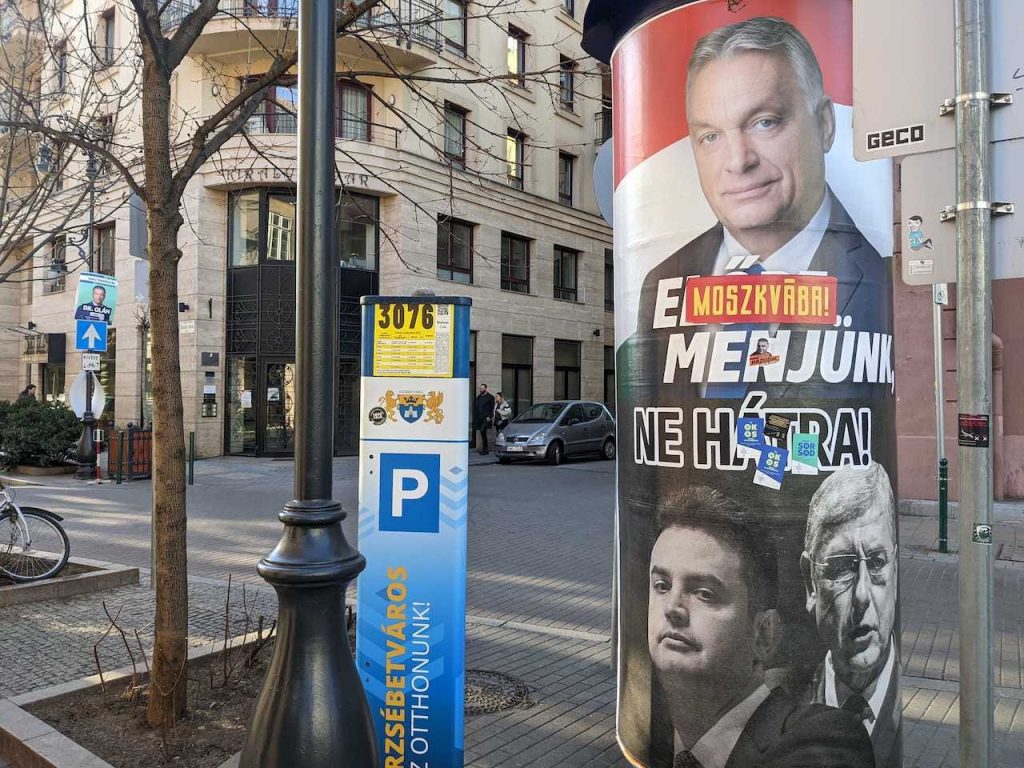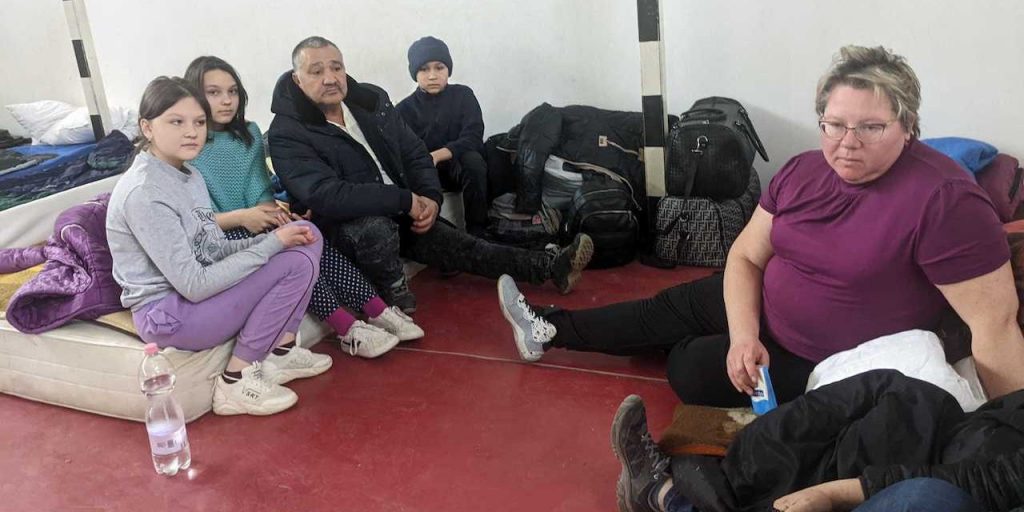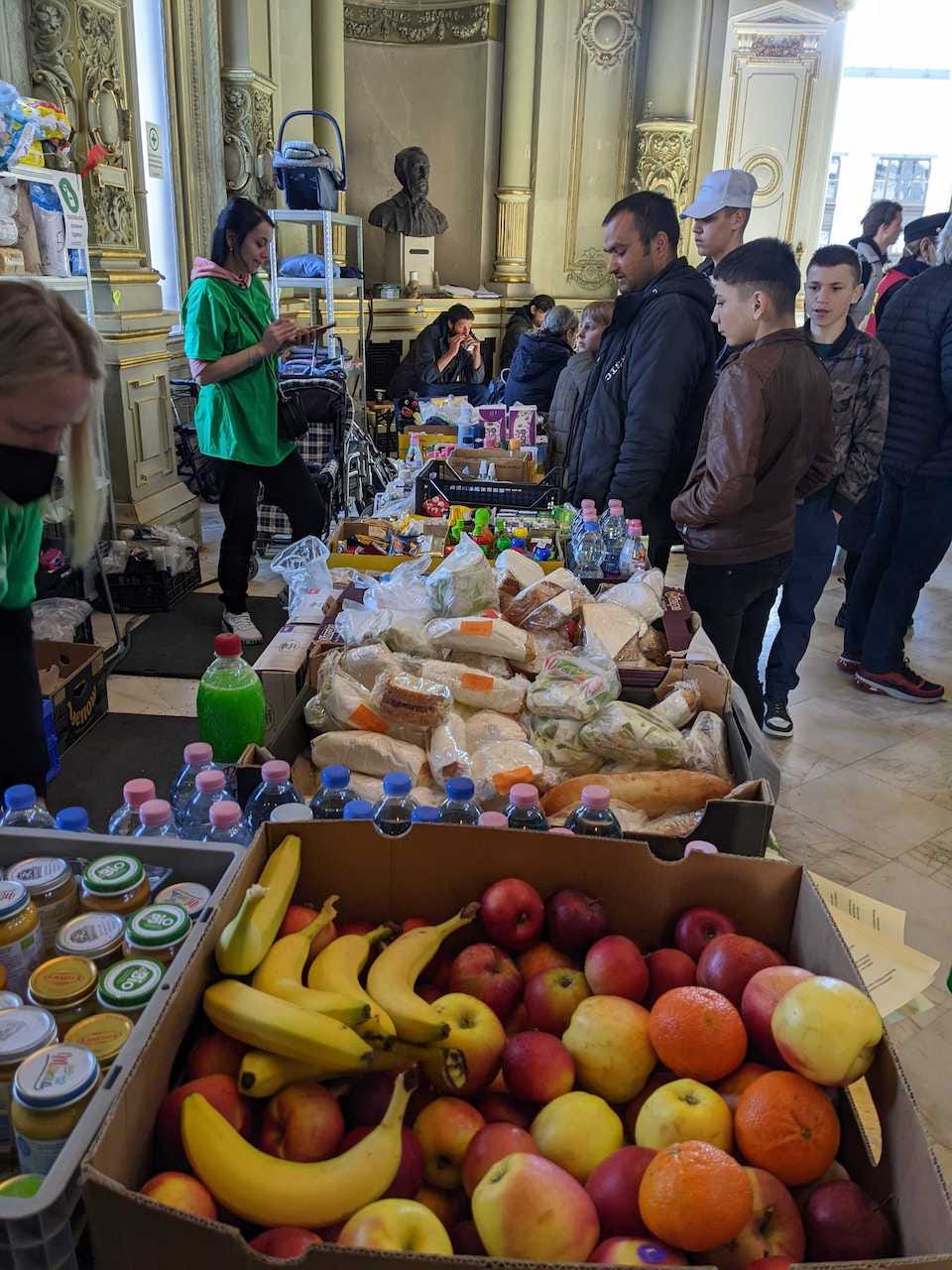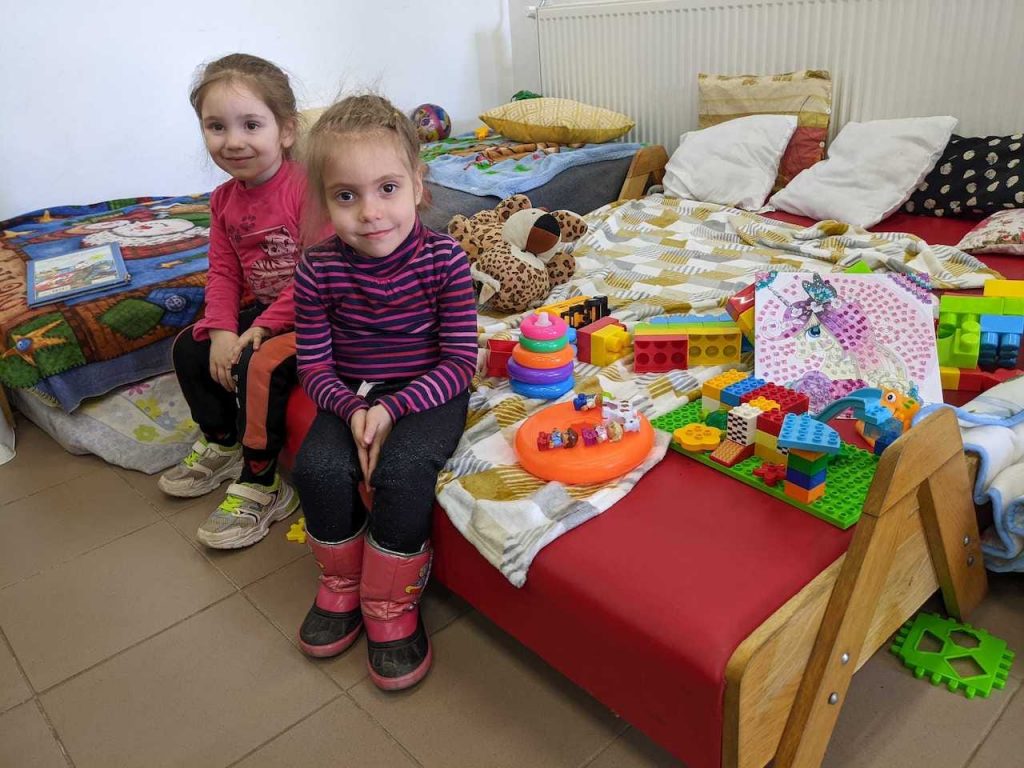On March 9, Irena Aizelman of Budapest got a call that 18 Ukrainian children who'd fled the wartorn city of Kharviv needed shelter in Hungary. Aizelman, who'd volunteered to help aid refugees amid Russia's war in Ukraine, made dozens of calls and eventually secured temporary housing for the children at a nursing home in the Hungarian capital. Since then, she's looked after them during the day, chaperoning them to doctors appointments, seeking out psychological services, and scouring the internet and her community for donations. It's not cheap to feed 18 adolescents.
"Unfortunately, we didn't have any kind of help from the government," she told Insider earlier this month in an interview at the nursing home, where the children were sprawled out around her on donated mattresses. "That's how it works."
Hungarian Prime Minister Viktor Orban, widely viewed as an authoritarian nationalist, and his right-wing Fidesz party have implemented some of the most anti-immigrant and anti-refugee policies in the European Union during their 12 years in power.
Emboldened by Europe's 2015 refugee crisis spurred by unrest in the Middle East and North Africa, Orban has made it virtually impossible to seek asylum in Hungary. The country has been accused of detaining and starving asylum seekers, among other systematic violations of EU law. But Orban was forced to make an exception for Ukrainians when Russian President Vladimir Putin began his full-scale invasion on February 24. That same day, Orban effectively opened Hungary's borders to Ukrainian refugees. The nation of fewer than 10 million has since taken in more than 450,000 people fleeing the conflict, according to the government.
"There is no ceiling for the number of refugees from Ukraine," a spokesperson for Orban's administration told Insider in a statement.

But the Hungarian government is ill-equipped to deal with the flow of refugees, according to interviews with NGOs and volunteers in Hungary. Non-profit organizations, civil society groups, churches and religious groups, and individual volunteers like Aizelman are providing most of the food, shelter, medical care, transport, legal aid, and other support on the ground. A select handful receive funding from the government.
"What you see is a lack of coordination, a lack of an effective use of the resources of the state authorities," said Andras Lederer, a senior advocacy officer at the Hungarian Helsinki Committee, a prominent watchdog and legal aid group.
Lederer argued that Hungary's lack of preparedness is a result of Orban's "willful dismantling" of the asylum system following the 2015 refugee crisis.
Hungarian authorities are also doing the bare minimum to inform Ukrainians of their rights, Lederer said. They won't receive temporary protected status unless they specifically apply for it. The government's hands-off approach simply isn't sustainable and will hurt many, he said.
"You can't leave all of these tasks to ordinary citizens. It's a very comfortable situation right now for the government, but you cannot expect people to host families in their own apartment, unknown families, mid-term or even long-term," Lederer told Insider. "You cannot expect Hungarian citizens to continue this work for months if the war continues for that long."

'Hungary is getting little gold stars'
Orban's hardline anti-immigrant policies have made him an international star on the far-right, winning him praise and tete-a-tetes with the likes of Fox News host Tucker Carlson and former President Donald Trump, who's given Orban his "Complete and Total Endorsement" in the runup to Hungary's April 3 elections.
At the same time, the prime minister's policy agenda and successful efforts to undermine Hungarian democracy have threatened his country's status in the EU. Europe's highest court has repeatedly ruled in recent years that several Hungarian immigration policies — including criminalizing aid to asylum seekers and restricting those who can apply for asylum — are illegal. In mid-February, the high court ruled that the EU could withhold billions of euros in pandemic relief funds to Hungary and Poland — the EU's other increasingly illiberal member — over these and other violations.
But the war has since distracted Europe from policing its members that fail to comply with EU law. Orban has already demanded that the European Commission release the frozen funds to help Hungary's humanitarian response. The war has also put enormous pressure on Hungary to work in sync with the bloc of 27 member-states, at least temporarily. After denouncing proposed EU sanctions on Russia in early February following a friendly meeting with Putin in Moscow, Orban declared his support for EU sanctions after the invasion, with the exception of any targeting Russian oil and gas.
"Orban is 100% populist, so he can change 180 degrees in an hour. And, literally, this is what happened," a Hungarian political strategist, who asked to not be named in order to speak freely, told Insider. "The pariah state is now over for him, at least for the time being."
Shifting positions has also likely won Hungary some points across Europe.
"Hungary is getting little gold stars for complying with EU law this time," Kim Lane Scheppele, a professor of sociology at Princeton and an expert on Hungary, told Insider.
Orban isn't advertising his reversal on asylum policy. In a speech at a large rally in Budapest last week, he made no mention of the tens of thousands of refugees who've poured into his country in recent days. Asked about concerns that the government is doing little to aid the refugee effort, a spokesperson for Orban insisted the government is competently coordinating "the largest humanitarian operation in Hungary's history."
Orban has also taken a substantially less critical approach to Putin, with whom Orban is closely aligned and heavily dependent on for energy. Three weeks before Russia's invasion of Ukraine, Orban called Hungary's relations with Putin "excellent." Orban has notably refused to transport weapons to Ukraine through Hungary and forged ahead with a major Russian-funded nuclear power plant. And Hungary's largely state-aligned media continues to pump out Kremlin propaganda.

'You don't have to say the quiet part out loud about race'
Orban has for years made it clear that he does not want his country to become "multicultural" or "multicolored," as he put it on the campaign trail in 2018, during the height of President Donald Trump's battle against immigration. He holds that most asylum seekers, particularly those who are non-white, non-Christian, and non-European, pose a threat to Hungary.
"We don't see these people as Muslim refugees. We see them as Muslim invaders," Orban told the German newspaper Bild in 2018 of people fleeing conflict in the Middle East.
Ukraine's refugees are largely white and some are even Hungarian speakers. "They look like Hungarians, they go to church, or don't go to church, but it doesn't push the same sort of buttons [as] large-scale immigration from Arab-majority countries in 2015 and 2016," Dalibor Rohac, a senior fellow at the conservative American Enterprise Institute and expert on Central and Eastern Europe, told Insider. "You don't have to say the quiet part out loud about race, everybody knows that's the case, that's what this is about … for [Orban and Fidesz], having refugees from a white European country is a different story from having refugees that are dark-skinned and Muslim."
Ukrainian Roma, who are ethnic minorities, have also sought refuge in Hungary in recent weeks and some have reported being treated differently by Hungarian authorities, Lederer said. Hungary is continuing to reject non-Ukrainian migrants and asylum seekers at its borders. Orban told Al Jazeera on March 3 that Hungarian border officials are still discriminating between so-called "migrants" and refugees at the border. "We are able to tell the difference between who is a migrant and who is a refugee. Migrants are stopped. Refugees can get all the help," he said.
The government has continued to differentiate between Ukrainian refugees and virtually everyone else looking to cross the border.
"One cannot draw parallels between those coming from Ukraine and illegal migrants," a spokesperson for Orban told Insider in a statement. "People fleeing from Ukraine have left their country because their lives were in danger, and Hungary, as the first safe country, is fulfilling its duty of helping them. By contrast, illegal migrants are not fleeing from direct threats or persecution, but are primarily seeking better living conditions."
The racism and xenophobia is also apparent in the country's domestic policy. Hungary is suffering from a severe labor shortage. Like other right-wing nationalists in Europe and the US, Orban is trying to convince native Hungarians to have larger families in an effort to fight the country's population decline.
Orban could use the refugee crisis to score political points
The crisis comes at a politically consequential moment for Hungary. Orban is up for reelection to a fourth consecutive four-year term next month in the most competitive race he's faced since 2010. He's polling several points better than Peter Marki-Zay, the conservative opposition candidate representing a joint coalition of six ideologically diverse parties, including socialists and the former far-right.

While Orban has been forced to at least temporarily reverse his core domestic policy in the wake of the war, Scheppele said he'll still be able to use the refugee crisis to boost his political capital.
"Orban is very adept at dancing between raindrops on things like this," Scheppele said. "It's inconvenient that this happens in the course of the campaign, but Orban has already found a way to utilize the refugee crisis for his benefit."
Regardless of who wins the April 3 election, Orban and Fidesz could benefit politically in the longer-term from Hungarian-speaking Ukrainians taking refuge in Hungary.
In what many view as a clever political ploy, Orban has for years offered citizenship and voting rights to the approximately two million ethnic Hungarians who live in neighboring countries. He's also sent billions of euros into their communities. Unsurprisingly, these Hungarians vote overwhelmingly for Orban and Fidesz.
Shortly after Russia annexed Crimea in 2014, Orban controversially announced his support for autonomy and dual citizenship rights for Hungarians in Ukraine.
One of these ethnic Hungarian communities is in western Ukraine. Orban has long fostered ties with a region of Ukraine on Hungary's border known as Transcarpathia, which was part of the Austro-Hungarian empire until WWI. The area is home to about 150,000 ethnic Hungarians, many of whom are now fleeing Ukraine and finding refuge in Hungary.
"Hungarian speakers who live abroad tend to be fairly loyal Orban voters," Rohac said. "He has sort of bought their loyalty with these citizenship policies, and I think that's true of Hungarian Ukrainians as well, whether or not they stay in Hungary or whether they eventually return back."
In the short term, it also may be politically beneficial to Orban that so much of the country is focused by the war and refugee crisis and not on the election.
Scheppele said some of the same refugee assistance groups and grassroots activists who are now on the frontline would otherwise have spent the crucial weeks leading up to the election campaigning for Orban's opposition. It's unclear how many of the volunteers are politically active. Lederer said he believes the majority of the groups aiding refugees are non-political, but that some grassroots volunteers might otherwise be canvassing for the opposition.
"Normally, a month before the election, they would be working on campaigning and getting out the vote and doing all kinds of infrastructural stuff for the election," Scheppele said of the volunteers and aid groups. "But now, they're not doing that because they're out at the border helping refugees because the Hungarian government is doing nothing."
Marina Shafit provided translation services in Hungary. Haven Orecchio-Egresitz reported from Budapest and Beregsurany.
